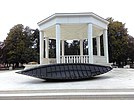Bjelovar-Bilogora County
Bjelovar-Bilogora County
Bjelovarsko-bilogorska županija | |
|---|---|
 Bjelovar-Bilogora County within Croatia | |
| Country | |
| County seat | Bjelovar |
| Government | |
| • Župan | Marko Marušić (HDZ) |
| • Assembly | 41 members |
| Area | |
| • Total | 2,640 km2 (1,020 sq mi) |
| Population (2021)[2] | |
| • Total | 101,879 |
| • Density | 39/km2 (100/sq mi) |
| Area code | 043 |
| ISO 3166 code | HR-07 |
| HDI (2022) | 0.835[3] very high · 17th |
| Website | www |
Bjelovar-Bilogora County (pronounced [bjêloʋaːr-bîloɡora]; Croatian: Bjelovarsko-bilogorska županija [bjêloʋaːrsko-bîloɡorskaː ʒupǎnija]) is a county in central Croatia.
The central city of Bjelovar was first mentioned in 1413, and it only gained importance when a new fort was built in 1756 to defend against the Ottoman invasions. The town was pronounced a free royal town in 1874.
The other part of the county name is for the hill of Bilogora that stretches along the northern edge of the county.
Other towns in the county are Daruvar, Garešnica, Čazma, and Grubišno Polje.
The Bjelovar-Bilogora County borders on the Koprivnica-Križevci County in the north, Virovitica-Podravina County in the northeast, Požega-Slavonia County in the southeast, Sisak-Moslavina County in the southwest, and Zagreb County in the west.
Alongside the City of Zagreb and Požega-Slavonia County, it is the only Croatian county that does not border another nation.
Administrative division
[edit]Bjelovar-Bilogora County is further divided into 5 towns (grad, pl. gradovi) and 18 municipalities (općina, pl. općine).
| Town | Population (2021 census)[4] |
|---|---|
| Bjelovar | 36,316 |
| Čazma | 6,930 |
| Daruvar | 10,105 |
| Garešnica | 8,624 |
| Grubišno Polje | 5,367 |
| Municipality | Population (2021 census)[4] |
|---|---|
| Berek | 1,106 |
| Dežanovac | 1,978 |
| Đulovac | 2,772 |
| Hercegovac | 1,910 |
| Ivanska | 2,256 |
| Kapela | 2,367 |
| Končanica | 1,805 |
| Nova Rača | 2,756 |
| Rovišće | 4,144 |
| Severin | 702 |
| Sirač | 1,796 |
| Šandrovac | 1,411 |
| Štefanje | 1,688 |
| Velika Pisanica | 1,313 |
| Velika Trnovitica | 1,091 |
| Veliki Grđevac | 2,316 |
| Veliko Trojstvo | 2,379 |
| Zrinski Topolovac | 747 |
Demographics
[edit]
|
| |||||||||||||||||||||||||||||||||||||||||||||||||||||||||
| Source: Naselja i stanovništvo Republike Hrvatske 1857–2001, Croatian Bureau of Statistics, Zagreb, 2005 | ||||||||||||||||||||||||||||||||||||||||||||||||||||||||||
As of the 2021 census, the county had 101,879 residents. The population density was 39 people per km2.[2]
As of the 2011 census, the county had 119,764 residents. The population density was 45 people per km2.[5]
| population | 84893 | 95981 | 101420 | 130901 | 150825 | 163039 | 162453 | 173597 | 166485 | 170651 | 167599 | 157811 | 149551 | 144042 | 133084 | 119764 | 101879 |
| 1857 | 1869 | 1880 | 1890 | 1900 | 1910 | 1921 | 1931 | 1948 | 1953 | 1961 | 1971 | 1981 | 1991 | 2001 | 2011 | 2021 |
Ethnic Croats form the majority with 84.8% of the population, followed by Serbs at 6.3% and Czechs at 5.2%.[6]
Politics
[edit]Minority councils and representatives
[edit]Directly elected minority councils and representatives are tasked with consulting tasks for the local or regional authorities in which they are advocating for minority rights and interests, integration into public life and participation in the management of local affairs.[7] At the 2023 Croatian national minorities councils and representatives elections Czechs, Hungarians and Serbs of Croatia all fulfilled legal requirements to each elect their own 25 members minority council of the Bjelovar-Bilogora County while Albanians, Germans, and Romani people in Croatia were electing individual representatives.[8] Some municipalities, towns or cities in the county elected their own local minority councils as well.[8]
Protected areas
[edit]See also
[edit]References
[edit]- ^ Ostroški, Ljiljana, ed. (December 2015). Statistički ljetopis Republike Hrvatske 2015 [Statistical Yearbook of the Republic of Croatia 2015] (PDF). Statistical Yearbook of the Republic of Croatia (in Croatian and English). Vol. 47. Zagreb: Croatian Bureau of Statistics. p. 62. ISSN 1333-3305. Retrieved 27 December 2015.
- ^ a b "The final results of the Census 2021 have been published". Croatian Bureau of Statistics. 22 September 2022. Retrieved 9 May 2023.
- ^ "Sub-national HDI - Area Database - Global Data Lab". hdi.globaldatalab.org. Retrieved 2024-10-10.
- ^ a b "Population by Towns/Municipalities" (xlsx). Census of Population, Households and Dwellings in 2021. Zagreb: Croatian Bureau of Statistics. 2022.
- ^ "Population by Age and Sex, by Settlements, 2011 Census: County of Bjelovar-Bilogora". Census of Population, Households and Dwellings 2011. Zagreb: Croatian Bureau of Statistics. December 2012.
- ^ "Population by Ethnicity, by Towns/Municipalities, 2011 Census: County of Bjelovar-Bilogora". Census of Population, Households and Dwellings 2011. Zagreb: Croatian Bureau of Statistics. December 2012.
- ^ "Manjinski izbori prve nedjelje u svibnju, kreću i edukacije". T-portal. 13 March 2023. Retrieved 10 June 2023.
- ^ a b "Informacija o konačnim rezultatima izbora članova vijeća i izbora predstavnika nacionalnih manjina 2023. VII. BJELOVARSKO-BILOGORSKA ŽUPANIJA" (PDF) (in Croatian). Državno izborno povjerenstvo Republike Hrvatske. 2023. p. 3-5. Archived from the original (PDF) on 10 June 2023. Retrieved 10 June 2023.












